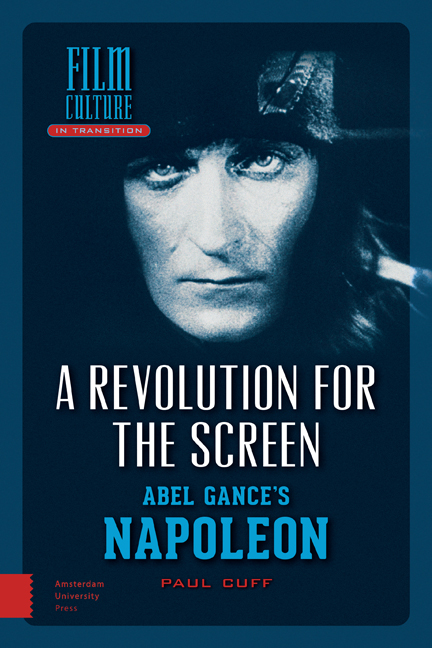Book contents
- Frontmatter
- Dedication
- Contents
- List of Illustrations
- Note on Formatting
- Acknowledgements
- Foreword
- Preface: Critical perspective
- 1 Napoleonic Ambition and Historical Imagination
- 2 Shaping Expectations: The Young Napoléon Bonaparte
- 3 Civilization and Savagery: Visions of the French Revolution
- 4 Mortal Gods: Voices of Power and of Providence
- 5 The Dark Light of Napoleonic Cinema
- 6 A View from the Margins of History
- 7 Melodrama and the Formulations of Family
- 8 Worlds in Transition: Class, consumption, Corruption
- 9 Death and Transfiguration
- Conclusion: The Case for Enthusiasm
- Filmography and Bibliography
- Index
- Film Culture in Transition
4 - Mortal Gods: Voices of Power and of Providence
Published online by Cambridge University Press: 10 December 2020
- Frontmatter
- Dedication
- Contents
- List of Illustrations
- Note on Formatting
- Acknowledgements
- Foreword
- Preface: Critical perspective
- 1 Napoleonic Ambition and Historical Imagination
- 2 Shaping Expectations: The Young Napoléon Bonaparte
- 3 Civilization and Savagery: Visions of the French Revolution
- 4 Mortal Gods: Voices of Power and of Providence
- 5 The Dark Light of Napoleonic Cinema
- 6 A View from the Margins of History
- 7 Melodrama and the Formulations of Family
- 8 Worlds in Transition: Class, consumption, Corruption
- 9 Death and Transfiguration
- Conclusion: The Case for Enthusiasm
- Filmography and Bibliography
- Index
- Film Culture in Transition
Summary
Even when fallen, especially when fallen, august are those men who, all around the world, with eyes fixed on France, struggle for the great work with the inflexible logic of the ideal; they give their life as a pure gift for progress; they accomplish the will of Providence; they perform a religious act. At the appointed hour, with all the disinterestedness of an actor reaching his cue, obedient to the divine scenario, they enter the tomb. And this hopeless combat, and this stoic disappearance, they accept in order to lead to its splendid and supreme universal consequences the magnificent movement of humanity, irresistibly begun on 14 July 1789. These soldiers are priests. The French Revolution is an act of God (Hugo 1862: IX/174).
Introduction
The imagery and logic of Gance's fantastical historicism derives from the methodologies of the Romantic era. Carlyle's The French Revolution is a prime example of how narrative and stylistic technique shapes factual evidence into a visionary account of the past. For Léon Bloy, the ‘intensity’ of this writer's ‘evocation’ seemed to derive from direct experience: ‘assuredly, he saw what he tells’ (1874: 125-6). As I suggested in chapter 1, the Romantic historian is both a narrator and a participant in their resuscitative account of events. Carlyle wears multiple ‘masks’ of the dead with the dexterity and ‘impersonality’ of ‘an actor of genius’; his crowd of reincarnated personalities produces ‘a vision’ that was more real for readers than any purely objective account (ibid.).
Such an approach necessarily meant inhabiting the dramatis personae of all historical positions and allegiances. This ubiquitous perspective on events is also evident in the dramas produced by Hugo, in which ‘a situation will commonly trigger two or more conflicting sympathies at different levels’:
[There is an] unusual […] intensity [in] the poet's emotional involvement in both sides of the antithesis […] He enters so wholeheartedly into the hidden currents and countercurrents that move within his characters, ‘good’ and ‘evil’ alike, that they seem to breathe and feel and live from the inside, from the very depths of their being – however extreme their beliefs may be, and however superficially implausible their situations (Blackmore/Blackmore 2000: xviii-ix).
- Type
- Chapter
- Information
- A Revolution for the ScreenAbel Gance's Napoleon, pp. 101 - 128Publisher: Amsterdam University PressPrint publication year: 2015



